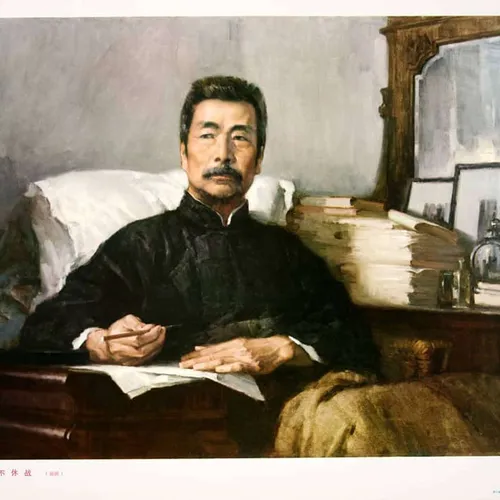
People's History of Ideas Podcast
In this podcast, Matthew Rothwell, author of Transpacific Revolutionaries: The Chinese Revolution in Latin America, explores the global history of ideas related to rebellion and revolution. The main focus of this podcast for the near future will be on the history of the Chinese Revolution, going all the way back to its roots in the initial Chinese reactions to British imperialism during the Opium War of 1839-1842, and then following the development of the revolution and many of the ideas that were products of the revolution through to their transnational diffusion in the late 20th century.
- Update frequency
- every 9 days
- Average duration
- 27 minutes
- Episodes
- 128
- Years Active
- 2019 - 2025

Two Incursions, One Betrayal, and Six Points for Attention: The Red Army in Chaling and Suichuan (October 1927 to January 1928)
The early progress of the Red Army in expanding Soviet power in the Jinggangshan region.
Further reading:
Stephen Averill, Revolution in the Highlands: China’s Jinggangshan Base Area
Pang Xianzhi and Ji…

Alliances, Discipline, and an Army to Serve the People: The Beginning of the Jinggangshan Base Area (October 1927)
Mao forges an alliance with Yuan Wencai and Wang Zuo, and the Revolutionary Army builds its capacity as a political force.
Further reading:
Stephen Averill, Revolution in the Highlands: China’s Jinggan…

The Early Jinggangshan Revolutionary Movement
How the Chinese revolution came to the Jinggangshan, and how the revolution and counter-revolution developed up until Mao’s arrival in October 1927.
Further reading:
Stephen Averill, Revolution in the …

Mao’s Bandit Comrades: Wang Zuo and Yuan Wencai
The stories of Wang Zuo and Yuan Wencai before they joined up with Mao Zedong.
Further reading:
Stephen Averill, Revolution in the Highlands: China’s Jinggangshan Base Area
Some names from this episode:
…

Bandits of the Jinggangshan
A closer look at the phenomenon of banditry in the Jinggang Mountains, because of the importance that banditry and other forms of collective violence had on how the revolutionary movement developed.
F…

Background on Society and Economy in the Jinggang Mountains
With particular emphasis on the geographical divisions between valleys and mountainsides, and ethnic divisions between Han and Hakka.
Further reading:
Stephen Averill, Revolution in the Highlands: Chin…

Entering the Jinggangshan: The Sanwan Reorganization of the People’s Army
As Mao’s troops arrive in the Jinggangshan region, a revolutionary reorganization of the people’s army is begun. Also, a tangent on Mao’s leadership style and nuclear war with a jump 30 years into th…

The Autumn Harvest Uprising in Hunan
The first days of Mao Zedong’s long career of armed struggle.
Further reading:
Marcia Ristaino, China’s Art of Revolution: The Mobilization of Discontent, 1927 and 1928
Roy Hofheinz, “The Autumn Harvest…

Planning the Autumn Harvest Uprising in Hunan
Mao doesn’t budge on his military line in the face of pressure from the Party Center, and then gets arrested.
Further reading:
Marcia Ristaino, China’s Art of Revolution: The Mobilization of Discontent…

The Autumn Harvest Uprising in Hubei
The planning and execution of the Autumn Harvest Uprising in southern Hubei province.
Further reading:
Marcia Ristaino, China’s Art of Revolution: The Mobilization of Discontent, 1927 and 1928
Tony Saic…

The “Tender-Hearted Communist:” Qu Qiubai
Background on Qu Qiubai before he became Communist leader in 1927.
Further reading:
Tsi-an Hsia, The Gate of Darkness: Studies on the Leftist Literary Movement
Jonathan Spence, The Gate of Heavenly Peac…

Army or Militia? Mao and the Politburo Diverge on Military Policy for the Autumn Harvest Uprising
Mao takes a critical position on the military line pursued by the Comintern and the Politburo. Also, the issue of scapegoating individuals as a way of dealing with repudiated party policies.
Further r…

The Decisive Turn to Overthrowing the Guomindang: The 7 August 1927 Emergency Conference
The new policy of mass uprisings against the Guomindang is decided upon, and Mao’s comments at the meeting stand out for their epistemology.
Further reading:
Marcia Ristaino, China’s Art of Revolution:…

The Nanchang Uprising (August 1, 1927)
The mutiny that founded the Chinese Red Army.
Further reading:
Tony Saich, The Rise to Power of the Chinese Communist Party
Stuart Schram, ed., Mao’s Road to Power, vol. 3: From the Jinggangshan to the …

The End of the United Front (June to July 1927)
As the Wuhan regime collapses, so does the united front. Soviet advisors leave China, Chinese Communists go underground. The purge strikes Wuhan.
Further reading:
C. Martin Wilbur, The Nationalist Revo…

“Like Taking a Bath in a Toilet” (May and June 1927)
The Comintern’s guidance falls short in response to the ongoing massacre of peasants.
Further reading:
C. Martin Wilbur, The Nationalist Revolution in China, 1923-1928
Donald Jordan, The Northern Expedi…

Mao Tries to Legislate a Peasant Revolution: The Wuhan Land Commission (April to May 1927)
Mao’s experience on the Wuhan Guomindang Left government’s Land Commission, with some comparative remarks on land reform in Communist thought.
Further reading:
Tony Saich, The Rise to Power of the Chin…

“An Example of the Chinese Tenant-Peasant’s Life”
This episode is an appendix to episode 51, and consists of a booklet written by Mao Zedong describing the life of a tenant-peasant in Hunan. This episode should help you to concretely picture peasant…

The Fifth Party Congress and the ‘Better Fewer but Better’ Approach to Summing up a Massacre
The Fifth Party Congress of the Communist Party (April 29 to May 9, 1927) decides that the united front is better without Chiang Kai-shek.
Further reading:
Steve Smith, A Road Is Made: Communism in Sha…

Rivers of Blood in the Streets of Shanghai: The Massacre of the Communists by the Guomindang Right
Chiang Kai-shek’s April 12, 1927 coup against the Communists.
Further reading:
Steve Smith, A Road Is Made: Communism in Shanghai, 1920-1927
Elizabeth Perry, Shanghai on Strike: The Politics of Chinese …